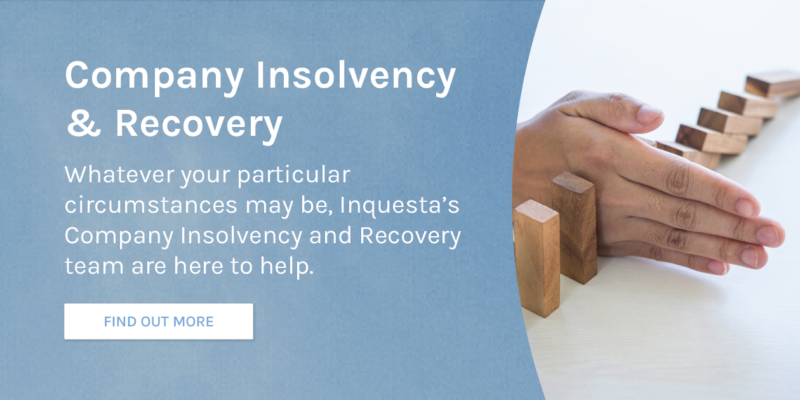Running a business is challenging, but the risks involved become all the more complex and high-stakes when issues of financial distress come into play. Directors are tasked with making key decisions to protect the company and its stakeholders, especially when insolvency looms on the horizon.
Any failure to uphold key fiduciary responsibilities can result in claims of director negligence, which can, ultimately, trigger a company’s downfall.
This blog explores how director negligence can lead to insolvency issues, the legal framework involved, and the action business owners should look to take in order to avoid personal and professional financial oblivion.
What is Director Negligence?
Director negligence occurs when directors fail to meet the basic responsibilities laid out in the Companies Act 2006. This includes acting in good faith, exercising reasonable care, doing due diligence, and above all else, always operating in the company’s best interests. During times of financial distress, negligence can worsen a firm’s situation and make recovery more difficult, if not impossible.
Some of the most common examples of director negligence that commonly lead to insolvency include:
- Failure to maintain consistent and accurate financial records, obscuring the true financial health of a business
- Ignoring blatant red flags of financial distress, such as mounting debt, negative cash flow, or pressure from creditors, and therefore allowing the problems to worsen without any attempt to rectify them.
- Engaging in acts of wrongful or fraudulent trading, particularly when times are tough and insolvency is imminent. This can expose directors to personal liability.
- Mismanagement of company funds or assets. This is considered director negligence as it can deplete business resources that may otherwise be necessary to address times of financial crises.
- Breaches of statutory obligations, directly leading to legal actions that could accelerate financial issues and, in turn, insolvency.
The level and seriousness of a director’s negligence will vary, from issues of oversight and incompetence, to deliberate misconduct in an attempt to take advantage of the system. Regardless of the nature of the infraction, its effect on a firm’s financial health can be potentially devastating — pushing it towards insolvency and creating serious legal and financial repercussions for directors.

How Director Negligence Can Lead to Insolvency
Director negligence leads to insolvency when actions of management erode a firm’s resources, increase liabilities, and damage creditor trust. Ultimately, all of the above can push a company into a position where it is no longer solvent. Additionally, some of the more severe acts of negligence could expose the business to legal penalties, furthering financial strain.
Some of the most common ways director negligence can result in company insolvency include:
- Poor Financial Management: Failure to monitor company cash flow, neglect proper budgeting, or overlooking the need for financial controls could quickly deplete working capital. Such issues could then make it increasingly hard to cover for operating expenses or meet creditor obligations. Ignoring such warning signs may further exacerbate these issues, sending the firm plummeting towards insolvency.
- Reckless Trading: A director who continues to trade in spite of clear signs of financial distress is acting negligently. For example, the taking on of any new debts during a time when the business is already struggling to meet its existing obligations will escalate the risk of insolvency. This can also include pursuing risky ventures or expanding without having a stable financial foundation to build on.
- Not Acting on Warning Signs: Negligence in this context occurs whenever a director disregards clear and obvious signs of potential insolvency (mounting debts, inability to pay creditors on time, cash flow shortages, etc.). Dismissing signs like this, without adjusting the company’s strategy or seeking professional advice, will worsen the financial situation.
- Breaching Compliance Requirements: It is the responsibility of directors to ensure that the business complies with all relevant legal and regulatory obligations, such as paying taxes on time and filing accurate financial statements. Neglecting to fulfil these duties can result in penalties, legal actions, or the loss of licences, adding financial strain in an already tough time.
- Not Considering Stakeholder Interests: Directors have an explicit duty to act in the best interest of the company and its existing stakeholders, including shareholders, creditors, and employees. Failing to properly and transparently communicate with creditors, or wilfully withholding critical information, can damage relationships, potentially limiting refinancing or restructuring options down the road.
- Mismanagement of Funds: Using company resources negligently, such as taking excessive dividends out, misallocating assets, or taking on debts without having a viable recovery plan in place, can quickly drain a company’s cash reserves. This will often result in a cash flow issue, leaving the firm unable to meet obligations in the long run — pushing it towards administration or liquidation.
- Delaying Professional Support: A common, but often not considered, example of director negligence is the delaying of engagement of an insolvency practitioner. As, by the time directors seek help, it may be too late to implement a proper recovery strategy. Insolvency practitioners can be key in identifying alternative courses of action you may not have considered to save the business.
The consistent thread in each of these examples is the impact director’s negligence can have on their business. Namely, that if times get tough, full financial recovery may be made more difficult. This will, ultimately, lead to an inability to pay debts as they fall due, and in turn trigger insolvency proceedings not long afterwards.
Legal Consequences for Negligent Directors
Once a business formally enters insolvency, the focus will quickly turn to how the directors managed, or mismanaged the company’s affairs, in the months and years leading up to this point in time. From disqualification and personal liability to criminal prosecution, director negligence, should it be uncovered at this stage, can have far-reaching legal and financial consequences.
Some of the primary consequences of director negligence include:
- Disqualification: Negligent directors can be disqualified from acting as a company director for a period up to 15 years under the Company Directors Disqualification Act 1986. Such a penalty can have serious, long-lasting repercussions on a person’s future career prospects and business opportunities, even after the disqualification period is up.
- Personal Liability: When directors are found guilty of wrongful trading or mismanagement, they may face personal liability for the company’s debts, especially if they have a pre-agreed personal guarantee in place. In this instance, creditors would be able to pursue the director’s personal assets in order to recover their losses.
- Criminal Prosecution: When director negligence involves issues of fraud or wrongful trading (or other illegal activities), criminal prosecution may soon follow. This can result in fines, imprisonment, or both — depending on the severity of the misdemeanour. The likelihood of criminal proceedings increases if deception or harm to creditors is involved.
- Damaged Reputation: A negligence claim, especially one leading to insolvency, can irreparably damage a director’s professional reputation. Any publicised disqualifications, personal liability issues, or criminal charges can deter prospective future investors, customers, employees, and stakeholders. It can also impact the director’s ability to take on new roles down the road.
- Ongoing Legal Proceedings: Directors found to have acted negligently could find themselves faced with a wave of lawsuits from stakeholders. Legal proceedings of this extent can very quickly drain personal finances and cause long-lasting financial and emotional strain.
Need Assistance From a Trusted Advisor? Speak to One of Our Experts Today
As we’ve established, director negligence won’t just damage personal standings — it can often also directly result in the company’s insolvency. Poor decision-making, a failure to address financial issues, and engaging in acts of wrongful trading, among other things, can all contribute to the acceleration of a firm’s decline.
Directors need to be able to recognise the warning signs of insolvency early in order to take swift and decisive action to prevent company closure taking hold. Doing so could not only save the business, but also protect the director from severe legal and financial consequences as well.
If you are a company director concerned with your role during periods of financial distress, or are facing allegations of director negligence, seeking professional advice early is essential. At Inquesta, we specialise in offering tailored insolvency support to help directors navigate the complexities of financial and legal challenges.
Get in touch with an expert member of our team today to find out how we can help, and receive guidance tailored specifically to you and your needs.




